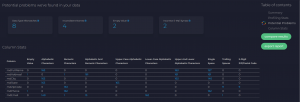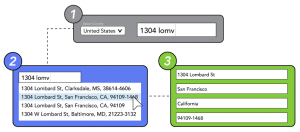By Barley Laing, the UK Managing Director at Melissa
Evolving technology is driving efficiencies in processes and reducing costs across most sectors. The significant impact of this trend is quite apparent in the public sector, where budgets have fallen dramatically, or are being scrutinised. Whatever the reason – continued government borrowing, increased spend during Covid, the cost of living crisis – public entities cannot afford waste and must double down on delivering efficiencies across the board.
Fortunately, forward-thinking public servants are staying abreast of and embracing the right technology to help them deliver more with less.
When it comes to data quality new technology is set to play a critical role in ensuring public bodies can efficiently and cost-effectively obtain accurate data on their users. The resulting benefits include reducing wastage and therefore the cost of communications, improving the user experience and reducing the opportunity for fraud. Stopping fraud will become increasingly important because the cost of living crisis, combined with the growth in digitalisation of services and remote working, will likely spur an increase in fraudulent activity.
Data decays quickly
With 91 per cent of organisations having common data quality problems poor data is obviously a big issue, which is perhaps not surprising when user contact data degrades at around 25 per cent a year without regular intervention. Also, from a data input perspective, 20 per cent of addresses entered online contain errors, such as spelling mistakes, wrong house numbers, or incorrect postcodes, primarily caused by people mistyping their details into small keyboards on their mobile devices.
This can lead to poorly targeted communications, and even leave some unable to access services they are entitled to. This results in precious budgets being wasted, a poor user experience, and even an increase in fraud. Those in the public sector need to leverage technology that will cost-effectively, and in real-time, ensure their databases contain accurate names, addresses, email addresses, and phone numbers.
Autocomplete fends off input errors
One of the most valuable pieces of technology for the public sector is an address autocomplete or lookup service which enables address validation and helps to deliver ID verification. This tool can gather accurate address data in real-time at the onboarding stage by providing a properly formatted, correct address as the user begins to input theirs. It also enables the delivery of a standout service by reducing the number of keystrokes required, by up to 81 per cent, when typing an address. This speeds up the onboarding process and reduces the probability of the user not completing an application to access a service.
onboarding stage by providing a properly formatted, correct address as the user begins to input theirs. It also enables the delivery of a standout service by reducing the number of keystrokes required, by up to 81 per cent, when typing an address. This speeds up the onboarding process and reduces the probability of the user not completing an application to access a service.
The first point of contact verification can be extended to email and phone, so that these valuable contact data channels can also be verified in real-time. This ensures the ability to communicate effectively with users, not just on the first occasion, but on an ongoing basis.
Match and dedupe for a single citizen view (SCV)
When it comes to data quality, paying attention to data duplication is equally important. The issue is commonly caused when two departments merge their data and mistakes in contact data collection have occurred at different touchpoints. Duplication adds cost in terms of time and money, particularly with printed communications, the distribution of which can also adversely impact on the sender’s reputation. Recipients will see this excess as a waste of public money, particularly at what has become a challenging time for public sector finances.
To prevent such waste engage an advanced fuzzy matching tool to deduplicate data. By leveraging this type of service, and merging and purging the most challenging records, it’s possible to create a ‘single user record’ and obtain a SCV. A SCV can be used to improve services and targeting, including personalisation of communications, which enhances the user experience. Organising contact data in this way will also ensure efficiency and cost reduction because multiple outreach efforts will not be made to the same person.
Additionally, the potential for fraud is reduced with the establishment of a unified record for each citizen. This highlights again the benefits of having data hygiene practices in place before applying ID verification tools. And since ID checks will pick up basic issues with data, such as an incorrectly formatted address, it’s better value and best practice to ensure you have accurate user contact data in the first place.
While some organisations might consider matching a once-in-a-while task, a third-party can perform this action more frequently – and economically – on their behalf. A professional services bureau using secure portals, with the necessary data privacy and handling conditions assured, can be a quick and easy way to achieve great results without integrating a service or buying additional software.
Smart data with Artificial Intelligence (AI)
Machine learning technology powers artificial intelligence (AI) to add even greater value to the data you hold. Semantic technology, or semtech, associates words with meanings and recognises the relationships between them readily delivering high value, in-depth intelligence on users of your services. It operates by making powerful real-time connections between records, combining the missing pieces of data to support an informed decision about the content of a communication to a user.
SaaS powers today’s data quality efforts
It’s never been easier or more cost-effective to manage data quality in real-time. Today, Melissa’s Unison licence provides access to a scalable data cleaning software as a service (SaaS) platform that requires no code, integration or training. Simply plug in and benefit, immediately. This technology instantly cleanses and corrects names, addresses, email addresses, and telephone numbers worldwide. It matches records in real-time, ensuring there is no duplication, and delivers data profiling to help identify issues for further action. A single, intuitive interface provides tools for data standardisation, validation, and enrichment resulting in high-quality contact information across multiple databases.
Decaying data quality is a growing issue for the public sector. It fuels unnecessary expenditures, inefficiency, fraud, and a poor user experience. To combat this decay it’s important to select and embrace new technologies that will quickly and cost-effectively solve this issue. Technology such as an address autocomplete service or an easy-to-use data quality interface can readily be licenced, with no integration, coding, or training necessary. This gives those in the public sector the means to leverage their data in ways they could have only imagined.
For more information about Melissa and how our data quality and identity verification services can help you, please visit: www.melissa.com/uk, email: barley.laing@melissa.com or call: 020 7718 0070.








Recent Comments